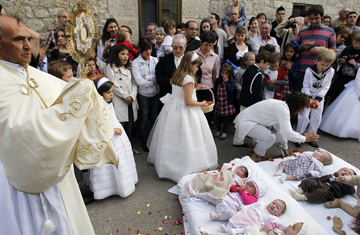
A priest blesses children in the village of Castrillo de Murcia in Spain on June 6, 2010
(2 of 2)
"There was no longer any legal cover for what they were doing," says lawyer Enrique Vila, who, in the Valencia case, is representing Anadir, an association of parents and children who believe they were the unwitting victims of these thefts. "But some doctors, priests and nuns realized that there were economic benefits to the practice."
Economic and, it seems, spiritual. Many of the women who believe their children were stolen were unmarried at the time, a shocking breach of social norms during the strict years of the Catholic Franco regime. Journalist Natalia Junquera has been investigating the cases for a series that the national newspaper El País is publishing this month. "From what I've seen, the most important motive was ideological," she says. "Nuns and priests who simply decided that the child would be better off with families they trusted than with the ones to which they had been born." The thefts are believed to have continued into the early 1980s.
So far, according to Anadir, only one mother-child pair has been reunited. A woman, born in 1971 and believing herself to have been adopted, joined the association in the hopes of simply locating her biological parents. When Anadir ran her information through its database, it discovered overlapping details with an older woman. According to Anadir, DNA testing confirmed that they were mother and daughter, though the elder woman had been told her child had died in the Barcelona hospital where she was delivered. Both women have kept their identities secret.
Spain's Episcopal Conference, the ruling body of the Catholic Church in Spain, has thus far not commented on the cases, saying only that it learned of their existence through the media. Vila emphasizes that he does not believe it was church policy to facilitate these thefts, but rather, a high number of nuns and priests are implicated because they formed an important part of hospital staff at the time. Still, he notes, "It's possible that the church simply looked the other way."
A similar attempt to bring these charges to court failed several years ago, when the investigating court ruled that there was insufficient evidence to doubt the children's causes of death. But this time, the government seems to be listening. In addition to Tuesday's hearing, it has authorized free DNA tests for any mother and child who believe themselves to be victims of a theft. The Valencia case, whose first, investigatory phase is expected to take six months, is being joined by similar ones in the Basque Country, Madrid, Catalonia, Andalusia and the Canary Islands.
For Pilar Maroto, these recent developments are a vindication. Waiting to enter the Congress building, she clutched the letter from the Almudena cemetery informing her that it has no record of her son being buried there, and issued a plea to the women who may have adopted a stolen baby. "Any mother with a minimal amount of dignity has to tell her child that he was bought," she told TIME. "First, so that those responsible for these crimes can be punished. And second, so that maybe those of us who lost our children can be reunited with them." Pausing to compose herself, Maroto noted that her son would now be 39 years old. "I still have hope we'll find each other."
